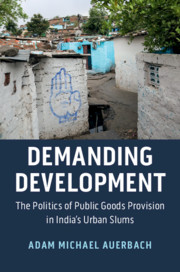Book contents
- Demanding Development
- Cambridge Studies in Comparative Politics
- Demanding Development
- Copyright page
- Dedication
- Contents
- Figures
- Tables
- Acknowledgments
- 1 Puzzling Disparities at the Margins of the City
- 2 Setting the Stage
- 3 How Party Worker Networks Impact Local Development
- 4 India’s Slum Leaders
- 5 Views from the Ground
- 6 Party Workers and Public Goods Provision
- 7 Why Party Worker Networks Spread Unevenly Across Settlements
- 8 Conclusion
- Book part
- Bibliography
- Index
- Other Books in the Series (continued from page iii)
7 - Why Party Worker Networks Spread Unevenly Across Settlements
Published online by Cambridge University Press: 15 October 2019
- Demanding Development
- Cambridge Studies in Comparative Politics
- Demanding Development
- Copyright page
- Dedication
- Contents
- Figures
- Tables
- Acknowledgments
- 1 Puzzling Disparities at the Margins of the City
- 2 Setting the Stage
- 3 How Party Worker Networks Impact Local Development
- 4 India’s Slum Leaders
- 5 Views from the Ground
- 6 Party Workers and Public Goods Provision
- 7 Why Party Worker Networks Spread Unevenly Across Settlements
- 8 Conclusion
- Book part
- Bibliography
- Index
- Other Books in the Series (continued from page iii)
Summary
Chapter 7 examines the formation of party worker networks, and the reasons why they vary so remarkably in their density and partisan distribution across settlements. The chapter presents quantitative evidence that key drivers of variation in party worker density are ethnic diversity and settlement population. Higher levels of social diversity increase the fractionalization of informal leadership within a settlement. Over time, parties attempt to bring slum leaders into their fold, increasing party network density in the process. The second is the population of the settlement. A slum’s population – the size of its “vote bank” – determines electoral incentives for parties to extend scarce patronage resources and positions to maximize votes.The chapter then takes an additional step backward, probing why settlements vary in their populations and levels of ethnic diversity in the first place. I find that idiosyncratic features of the urban geography and constraints over where poor migrants settle influence settlement size and ethnic diversity, providing analytical leverage in explaining their impact on party organization and, in turn, public services.
Keywords
Information
- Type
- Chapter
- Information
- Demanding DevelopmentThe Politics of Public Goods Provision in India's Urban Slums, pp. 206 - 221Publisher: Cambridge University PressPrint publication year: 2019
